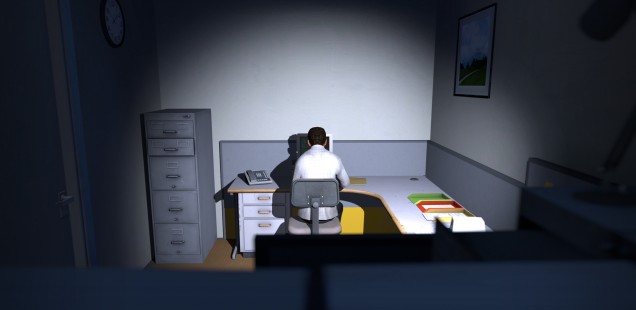
Off The Grid: The Stanley Parable
Zachary Brictson has been dutifully pressing buttons for us, the fool.
Built upon limited first person interaction and the voice of a British narrator, The Stanley Parable may come off as yet another intimidating indie project obsessed with its own creativity and to a point of vagueness. It’s synopsis alone readies the eyes to roll: “There is a story, there is no story. There is an ending, the game never ends.” Once the narrator glosses over your character’s life as an office worker named Stanley, a man who performs single key presses at his computer day in and day out without question, the expectation of primitive, but convoluted social commentary settles in.
Indeed, the day comes when instructions stop appearing on Stanley’s computer screen. With no reason to press more buttons, he becomes anxious and decides to investigate. Stepping from his lonely office, he explores his abandoned workplace to the whim of the preemptive narrator: “Stanley decides to walk to the meeting room, perhaps he just missed a memo,” he muses. But since you obviously have control of this character, you’ll quickly realize that you don’t necessarily have to follow the narrator’s wishes. If he says go left, you may very well go right, making the orator adjust his plans for you in all sorts of humourous, dark and frustrating ways.
Now, is that really all The Stanley Parable has to offer? An obvious nudge at a corporate culture that treats its employees as numbers, a slight glance at the nature of free will and some clever dialogue? It turns out that yes, if you follow the narrator verbatim, that’s exactly what you’ll be rewarded with: a theme so transparent and a plot so blunt that it couldn’t be interpreted as anything other than a mockery of itself. The game will then restart, stepping Stanley from his office once more, and you’ll again have an opportunity to both obey and disobey the narrator to different degrees of conflict.
The simplicity is striking. Multiple endings are hardly hidden, but rather laid openly upon minimal level design. It’s easy as pressing a different button here, or taking a different turn there. You may bore yourself in trying to dig up every easter egg, but the narrator’s script reacts to your behavior dynamically enough to keep exploration tolerable. With each outcome to the story you find, its brilliance will creep up on you.
It’s being said among users that new players shouldn’t read about the game like this, that it would spoil the experience. However, that thought process misses the point of The Stanley Parable. The real ‘twist’ of the game is that despite its dependence on deception, its underlying concepts are honest and relatable to anyone who regularly enjoys this hobby. There’s no urge to jump to an internet search engine on this one. No need to find other players smarter than you in hopes of understanding some lost meaning. It’s all here, a profound message about the relationship between gamer and game designer, wrapped in a package anyone can open.
Zachary Brictson is a Computer Science graduate from Northern Illinois University who chooses to write about games rather than code them, contributing to physical publications like The Printed Blog, sites such as Playstation Universe, and his own blog, Up Magic.